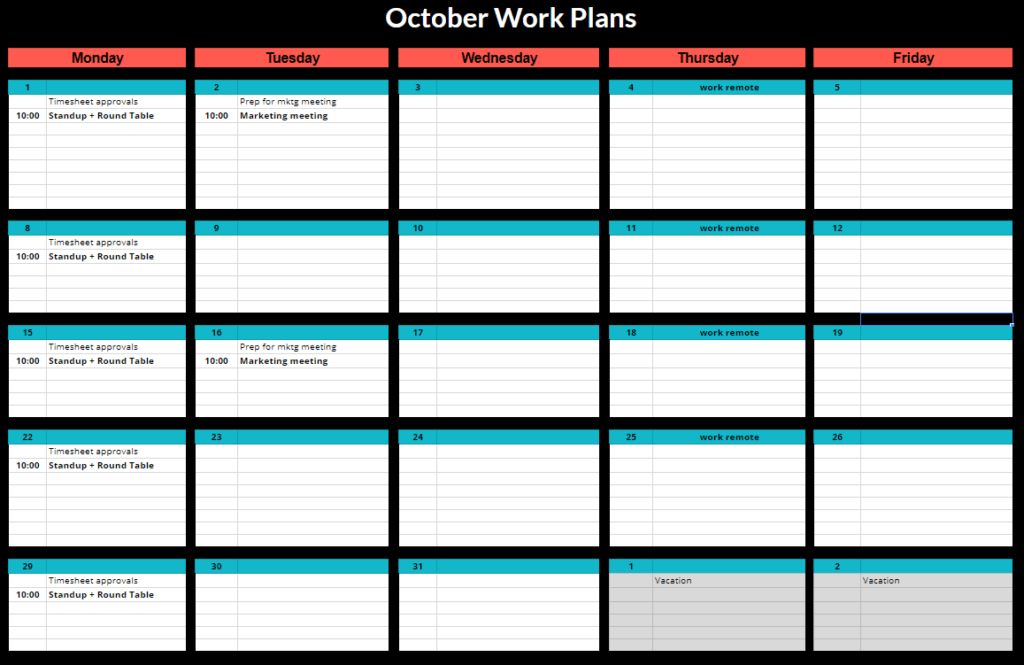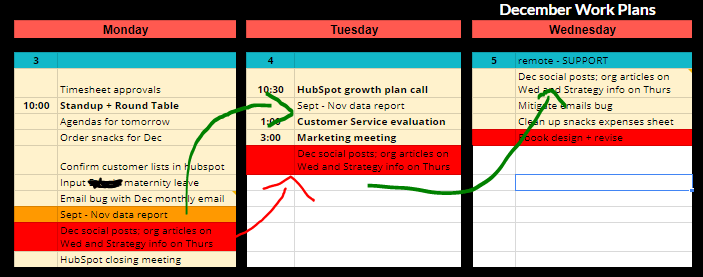
I came in to work and did the same stuff week after week. A lot of the time, I’d leave work with a longer list of the things I needed to get to than I had when I’d arrived. It made me feel like my productivity was lacking. I was on a five-day loop, never getting past weekly tasks to things that would further long-term team goals. And, honestly, I got tired of it.
Efficient Planning for Productivity
I do a lot of data science. So, naturally, I decided I’d need data on my work to find a good solution for my predicament. I decided to throw my weekly planner out and look at my work 6 weeks at a time. In the process, I auditing myself to see exactly what I was and was not accomplishing, and why.
Just use Excel, No Need to Get Fancy
If you’ve read some of my blogs before, you’ll know I love software and really love optimization through business automation. I’m always hungry to know what can help our team do a job at a higher level of quality, efficiency, and personal fulfillment.
So, you might be surprised to know that after researching the options out there for task and project management, I decided that the best tool for this undertaking was just Google Sheets. Plain and simple.
I made a template for a makeshift calendar that I could enter notes in ahead of time. This included what I planned to do each day in that six weeks. Then, I’d update it as I went along, with a short description of every task I did that day.
I also added the sheet to my default browser tabs. So, as soon as I called up the web each morning, my long-term work plan would greet me.

Analyze the Data & Do Something About It
After the initial six weeks, I spent an afternoon poring over what I’d accomplished and how my weeks “flowed”. I was quickly able to see the time-suck tasks were that were cutting into more valuable work time, and set about reducing them.
For example, I found that having a marketing team meeting every week was slowing our progress rather than maintaining momentum, as we thought it would. Here’s what it looked like, for me specifically:
On Monday afternoons, I’d look into Marketing data and what work I’d completed over the previous six days. That way, I could prep for the meeting Tuesday morning. Then, I would spend Wednesday implementing any action steps, only to do it all again four days later. That’s great if those tasks constitute your whole job, but not if it’s just supposed to represent a small facet of it.
Once I discovered that major inefficiency and what it was costing in effectiveness, I pitched bi-weekly meetings to the team. Turns out, I wasn’t the only person caught in the loop.
We shifted the schedule, and our productivity is markedly better not only in the Marketing department, but in our specific areas as well. Best of all, the meetings we have are more engaging and solid, because there’s enough time in between to actually need an update.
Once I had dealt with a couple of those big time-sucks, I wanted to know how I was doing on task management on a more granular level. Warning: there is color coding involved.

Your Way May Not Be the Best Way
For the next six weeks, if a task carried over multiple days, I marked it in orange on every day that I worked on it, only marking it completed on the day which it was. If I had to totally put off a task, I marked it in red, and carried it forward in a similar fashion.
Over time, this provided me a visual for exactly where I was reaching my capacity. It also showed what types of tasks I wasn’t giving enough attention. But most importantly, I was able to see productive and unproductive patterns. So, I could make changes to my planning and behaviors based on that information.
I found I have a tendency to spend a little bit of time each day for weeks on a project I could finish in a day or two if I devoted myself to it. I was costing myself and my teammates productivity in the process. So, I began making efforts to schedule more focused time instead of spreading things out.
Every Manager Should Audit for Productivity
This simple process revolutionized not only the way I work, but over time, the way I delegate to and lead teams. As leaders in the workplace, we need to be willing to ask hard questions of the status quo of our weekly work schedule. For our own benefit, yes, but also for the benefit of our teams and organizations at large.
I’ve been keeping these notes (with a few tweaks to my process) for a full six months now. And I don’t think I’ll ever go back to daily or weekly planning and to-do lists. In fact, I asked some of my teammates to audit their productivity in a similar fashion just for four weeks. They loved it so much they haven’t stopped! You should consider this strategy for organizations.
Did you enjoy this discussion? Consider reading our blog on work life balance.
Article written by Erica Bass
Last updated March 10, 2023




